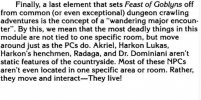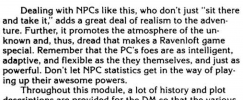- Joined
- Aug 20, 2017
- Messages
- 8,375
- Reaction score
- 24,270
Our disagreement is specifically on when the game starts I think.Uh, the campaign starts when the game starts. I actually assume I must not know what you're asking, because if I'm reading that correctly, it's so axiomatic that it seems like an absurd question.
If I've read you correctly, you're saying the game only starts once characters are generated and that the character creation process is entirely separate from the game. I'm saying the opposite; it's an integral part of the RPG.
Because the definition states that an integral part of a sandbox is that '"the players have the ability to "trash the campaign"'. And I agree. The players, not the characters. So they need to be able to trash the campaign when creating PCs, not afterwards.Why does a definition of a playstyle need to tell you when an RPG has started?
Almost all campaigns claim that the PCs can do anything. In some they can. But there's also a lot of campaigns where that's an illusion, because of the assumption that they'll stay within set parameters. I think we'd agree those are false sandboxes though?If they can, then they can. The definition has nothing to do with if they do or do not.
An original premise like "you're all members of a thieves guild". That's a qualifier; it states that the early stages of the campaign will follow that particular route. It's a GM direction.What "original premise"? And no, character creation does not take place "in the game", no one is role-playing yet.
And sorry, but at no point does the definition suggest that character creation isn't part of the game. Of course it's part of a RPG as a whole. And again, "The players have the ability to "trash the campaign". The players have the freedom to choose who they play.
"the GM acts as a neutral arbiter of events in the gameworld and the manner in which the gameworld responds to the players, without an objective or steering the action in any particular direction."Why wouldn't it be?
It breaks that.
Nope. I know I'm repeating myself here, but I'm arguing for a broader definition of trashing the campaign. And about when "their actions not limited to staying within the bounds of a preconceived premise" actually kicks in; especially as the definition makes clear that we're talking about player actions, not PC actions....you didn't read the definition?
OK, that's me being flippant. But your questions all seem to be either self-evidently answered by the definition, or completely unrelated to it





 .
. !
! ? If I say "we're starting the game in Not-England" and I get two kung-fu masters and a Half-Tengu...should I now make it a game set in Not-China?
? If I say "we're starting the game in Not-England" and I get two kung-fu masters and a Half-Tengu...should I now make it a game set in Not-China? !
! !
! ). Honey, do you feel like making a trip to the next town in the near future? We know you had to leave in a hurry, but it's not too much bother, right
). Honey, do you feel like making a trip to the next town in the near future? We know you had to leave in a hurry, but it's not too much bother, right ?
?